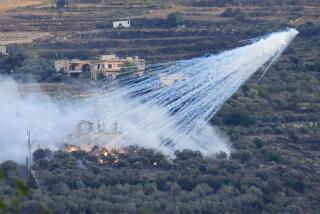Hagel calls claims of Syrian chemical weapons use only ‘suspicions’
CAIRO — Defense Secretary Chuck Hagel on Wednesday described Israeli claims of Syrian chemical weapons use as unproven “suspicions” and declined to set a timeline for a U.S. assessment of the accusations.
Hagel has instructed defense intelligence agencies to investigate allies’ reports that the Syrian regime used a sarin-based nerve agent in attacks against rebels March 19, U.S. officials said. Britain and France last week made similar assessments, but Hagel said the United States wouldn’t rush to make its own determination despite President Obama’s warnings that Syrian chemical weapons use would be a “red line.”
“Suspicions are one thing, evidence is another,” Hagel said in Cairo, his latest stop in a weeklong Mideast swing. “I think we have to be very careful here before we draw any conclusions based on real intelligence.”
Hagel stressed that he wasn’t questioning the Israeli assessment, which came in a speech Tuesday by Brig. Gen. Itai Brun, Israel’s top military intelligence analyst. Brun said the findings were based on reports that victims of the attacks in Aleppo and Damascus, Syria’s largest cities, had constricted pupils and were foaming at the mouth.
The lack of a U.S. response to the allegations by three close allies reflects a growing quandary for the Obama administration: Although Obama has suggested that the U.S. military would have to intervene in Syria if President Bashar Assad’s regime unleashed or lost control of its chemical weapons stockpiles, U.S. officials are extremely reluctant to become involved in the country’s civil war.
For Hagel, making his first visit to the Middle East as Defense secretary, the timing of the Israeli disclosure is particularly awkward. Aides learned of the speech just as Hagel was wrapping up a third day of meetings in Israel with Prime Minister Benjamin Netanyahu and other top officials. None shared the assessment with him, Hagel said.
Pentagon officials said the United States was working with Israel, Britain, France and others to verify the claims, but they declined to discuss the details of intelligence efforts. Other countries’ assessments have been based in part on soil samples and witness interviews, but intelligence gathering has been extremely difficult because of the intensity of the fighting in Syria.
As the Syrian government has lost ground to opposition fighters in recent months, concern has grown that Assad will use his large stockpile of nerve agents and other chemical weapons against them. The Obama administration over the weekend announced $123 million in new nonlethal assistance to the opposition, but it hasn’t furnished them with military aid for fear that the weaponry could fall into the hands of extremists within their ranks.
Despite their allegations of chemical weapons use, France and Britain haven’t pushed forcefully for military action, in part because of questions about the opposition forces.
“The use of chemical weapons in an environment like Syria is very difficult to confirm,” said a senior U.S. Defense official who spoke on condition of anonymity because of the sensitivity of the issue. “Given the stakes involved, low-confidence assessments by foreign governments cannot be the basis for U.S. action.”
ALSO:
Italy nominates youngest prime minister in years
Clashes between police and Uighurs in China leave 21 dead
Could Iran’s presidential politicking open door to nuclear deal?
Twitter: @Sbengali
More to Read
Sign up for Essential California
The most important California stories and recommendations in your inbox every morning.
You may occasionally receive promotional content from the Los Angeles Times.










